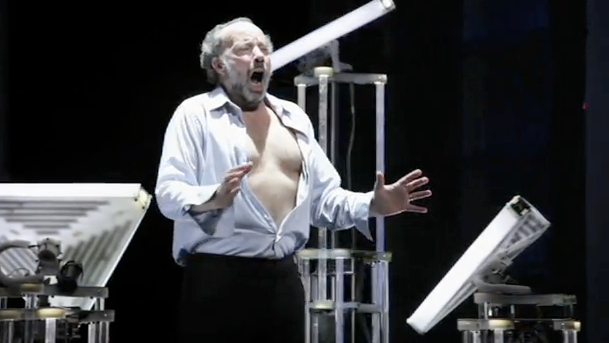MIT’s Opera of the Future Features Singing Walls and Dancing Robots
We may earn revenue from the products available on this page and participate in affiliate programs. Learn more › A...

We may earn revenue from the products available on this page and participate in affiliate programs. Learn more ›
A new opera produced by the lab behind Guitar Hero technology includes robotic singers, interactive instruments and a focus on technology that could change the way we experience live performances.
“Death and the Powers,” which has been 10 years in the making, premieres later this month in the city-state of Monaco, whose ruler, Prince Albert II, is the project’s patron. It’s the first royal performance to feature OperaBots.
Composer and MIT Media Lab professor Tod Machover, who has composed for the violin virtuoso Joshua Bell and designed customized instruments for Prince, conceived the project. Several years ago, Machover’s audience-interactive Brain Opera project led to the technologies behind the Guitar Hero and Rock Band video games.
The one-act production, which tells the story of a successful inventor and his plan to live forever through technology, uses gadgets as characters.
The opera takes place sometime in the future, when no humans remain — only robots. Former poet laureate Robert Pinsky wrote the libretto, which tells the story of an inventor named Simon Powers. Powers builds “The System” to preserve his legacy, allowing him to download his memories and personality into the built environment. His personage is then expressed through robots, giant blinking bookcases and a musical chandelier made of Teflon, which his wife plays like a harp.
There’s no explanation about where the humans have gone, but they left the robots a special text about relationships and the human condition. Gradually, by reading the text, the robots come to understand what it means to be human. Machover explains more in this video.
To build realistic OperaBots, two PhD students in Machover’s Opera of the Future Group developed software that Machover calls “disembodied performance.” The students, Peter Torpey and Elly Jessop, measured singers’ voice volume and pitch as well as muscle tension and breathing patterns. “The System” therefore takes on a realistic personality, MIT News explains.
Machover said he was turned off by a recent Taylor Swift concert he attended with his teenage daughters, in which megascreens and boom boxes overpowered Swift herself.
“Theater has been especially bad at allowing technology to make you feel closer to the performers on stage,” he said.
Opera enthusiasts are already excited about the production — Marc Scorca, president and CEO of Opera America, hopes it will inspire other operas, MIT says. In that spirit, here’s to a future where opera means more than a Web browser. Break a leg, OperaBots!